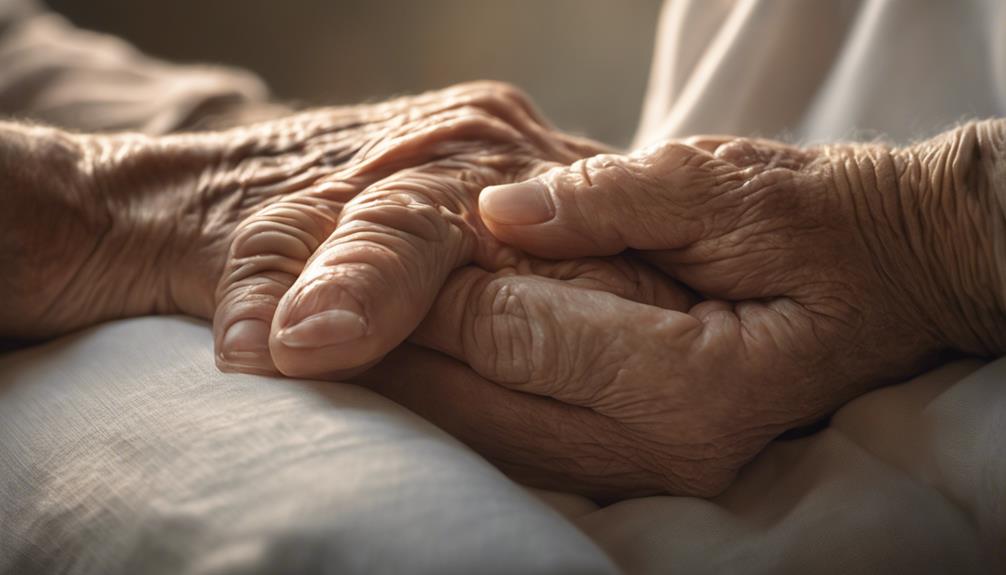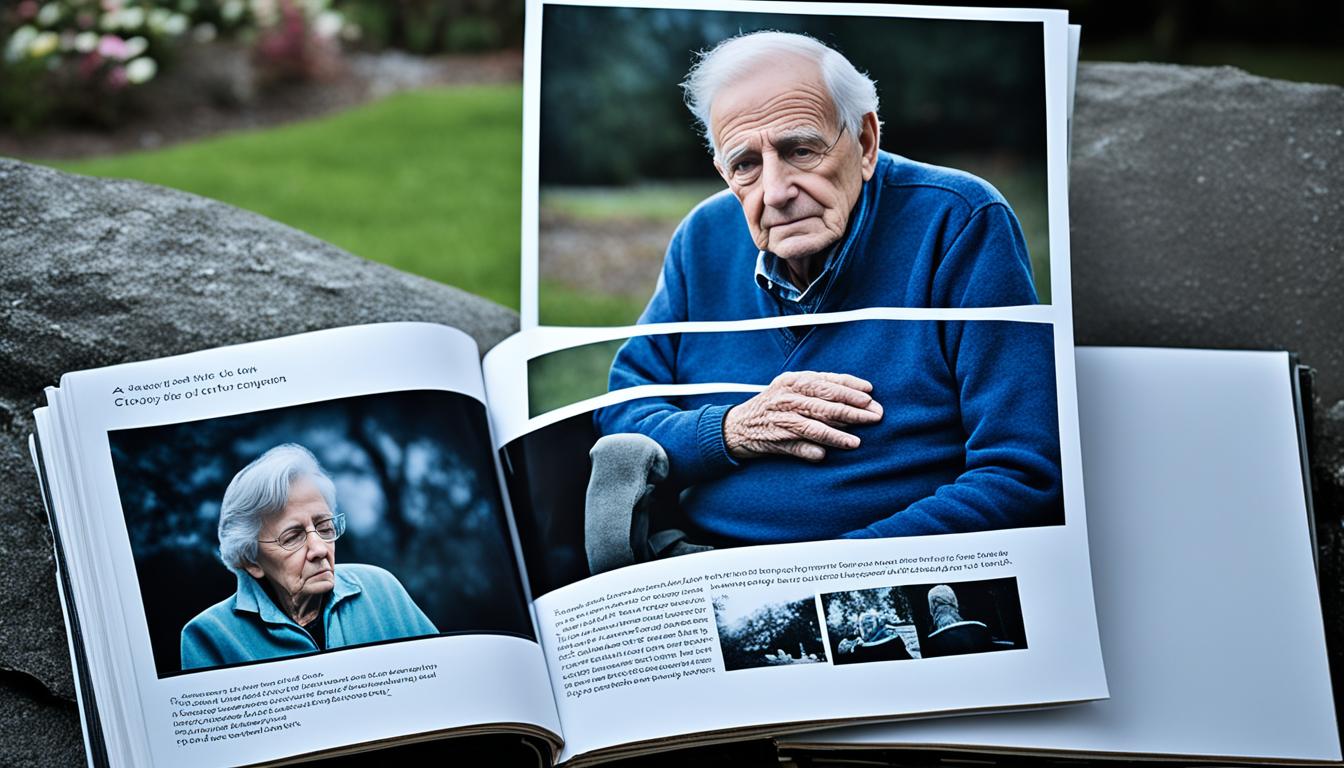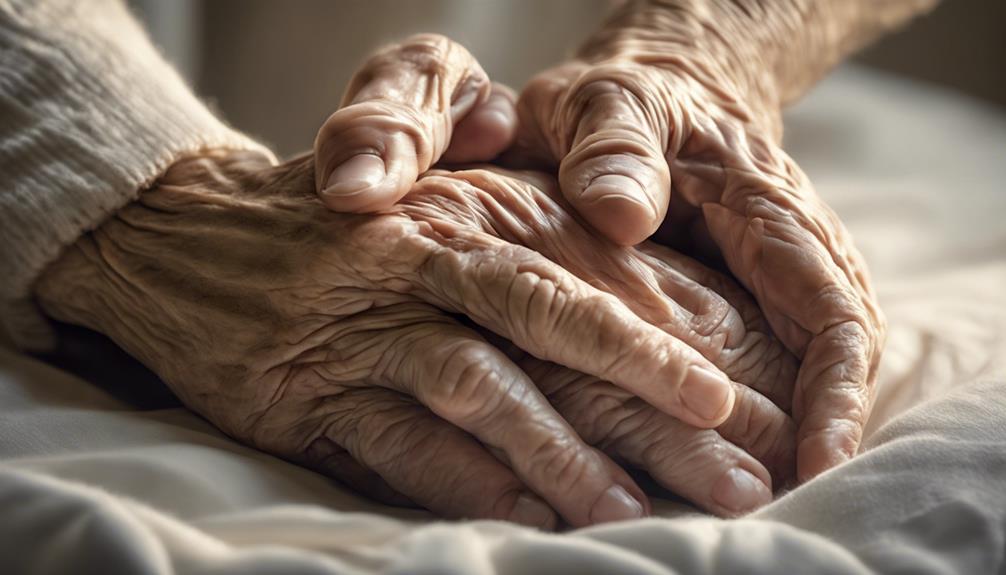When a compassionate and dedicated hospice care team prioritizes the individual needs of a patient with dementia, the impact is profound. Through custom pain management strategies and specialized dietary plans, hospice care truly excels in promoting comfort and overall health.
But there's more to this holistic approach than meets the eye. Stay tuned to discover the lesser-known ways hospice supports dementia patients and their loved ones through emotional, educational, and end-of-life care initiatives.
Key Takeaways
- Specialized symptom management tailored for dementia-related distress.
- Emotional and spiritual support to enhance dignity and peace.
- Family education on dementia symptoms and communication strategies.
- Assistance with end-of-life planning and compassionate care for dementia patients.
The Importance of Symptom Management
In hospice care for dementia patients, specialized symptom management plays a crucial role in enhancing quality of life by addressing pain, agitation, and anxiety through personalized treatment plans. The dedicated team at hospice understands the unique challenges faced by dementia patients and tailors medications and therapies to alleviate these distressing symptoms effectively. By focusing on personalized treatment plans, hospice aims to provide comfort and promote dignity during the end-of-life experience for individuals with dementia.
Medications are carefully selected and adjusted as needed to ensure optimal symptom management. Therapies such as music or art can also be incorporated to enhance the overall well-being of dementia patients. The hospice team regularly evaluates and adapts these strategies to meet the evolving needs of patients, ensuring that they receive the best possible care. By effectively managing symptoms, hospice helps alleviate suffering, improve quality of life, and create a more peaceful environment for dementia patients during this challenging time.
Emotional and Spiritual Support

Providing essential emotional and spiritual support is a cornerstone of hospice care for dementia patients. This compassionate care aims to enhance the quality of life for individuals navigating the challenging journey of dementia progression. Hospice teams understand the unique needs of dementia patients and offer supportive services tailored to address their emotional and spiritual well-being. Trained volunteers, chaplains, and counselors play a vital role in providing companionship and understanding to alleviate feelings of anxiety, fear, and loneliness often experienced by dementia patients. By creating a comforting environment that promotes peace, dignity, and respect, hospice professionals help guide individuals through their end-of-life journey with compassion and care.
| Supportive Services | Hospice Teams |
|---|---|
| Address Emotional Needs | Collaborative Care |
| Alleviate Anxiety and Fear | Promote Peace and Dignity |
| Enhance Spiritual Well-being | Respect for End-of-Life Journey |
| Provide Companionship | Understanding and Compassion |
| Focus on Quality of Life | Tailored Supportive Services |
Family Education and Guidance
When supporting families of dementia patients, hospice prioritizes providing essential education and guidance on understanding symptoms, managing behaviors, and making care decisions. Understanding the challenges of caring for a loved one with dementia can be overwhelming. Here is how hospice supports families through education and guidance:
- Understanding Symptoms: Learning about the progression of dementia and its impact on the patient can help you anticipate and better respond to their needs.
- Managing Behaviors: Coping with challenging behaviors in dementia patients requires patience and specialized techniques that hospice can teach you.
- Communication Support: Effective communication is vital in providing care for dementia patients, and hospice offers guidance on maintaining meaningful connections.
- Emotional Impact: Caring for a family member with dementia can take a toll on your emotional well-being, but hospice is there to provide resources and support to help you navigate this difficult journey.
End-of-Life Planning Assistance

Supporting families of dementia patients through the challenging journey of end-of-life planning involves assisting with advance directives and care preferences, navigating treatment decisions, and offering emotional and symptom management guidance.
When it comes to end-of-life planning, hospice provides a crucial role in helping dementia patients and their families make decisions that align with their values and wishes. Understanding the unique needs of dementia patients, hospice professionals work closely with families to explore treatment options that prioritize quality of life and comfort.
Emotional support and counseling are integral parts of this process, ensuring that families feel supported and informed every step of the way. Hospice also focuses on symptom management and pain control, tailoring interventions to provide compassionate care that meets the individual needs of each dementia patient.
Bereavement Support and Counseling
In hospice care, families of dementia patients receive bereavement support and counseling to help them navigate the grieving process after their loved one's passing. Hospice provides a range of services to assist family members in coping with their loss and finding ways to honor their loved one's memory.
Here are some key aspects of bereavement support and counseling offered by hospice:
- Trained counselors and social workers offer emotional support and guidance to family members throughout their grieving journey.
- Individual counseling sessions are available to help family members process their emotions in a more personalized setting.
- Group counseling sessions create a supportive environment where family members can connect with others who are also experiencing loss.
- Bereavement support and counseling aim to assist family members in adjusting to life without their loved one and finding comfort in their memories.
Frequently Asked Questions
What Does Hospice Do for Someone With Dementia?
Hospice provides specialized care, comfort, and support for someone with dementia. They tailor care plans to manage pain and enhance quality of life.
Emotional and spiritual support from volunteers and counselors helps you and your family navigate this challenging time. Educational guidance equips at-home caretakers to provide optimal care.
Backup support and respite care are available to prevent burnout and ensure continuous care, all aimed at enhancing overall well-being.
What Are 3 Things to Never Do With Your Loved One With Dementia?
When caring for a loved one with dementia, it's vital to remember three key things:
- Avoid correcting their memory lapses, as it can cause distress.
- Refrain from pressuring them during daily activities, as it may lead to agitation.
- Never leave them unsupervised in unsafe situations due to cognitive impairments.
Always prioritize their emotional needs and simplify communication to ensure understanding and comfort. Your patience and support are invaluable in their journey.
How Long Does Final Stage of Dementia Last?
In the final stage of dementia, the duration can vary from weeks to years depending on factors like health. Cognitive decline, communication challenges, and total dependence on others are common. Behaviors and physical abilities change drastically.
Individuals may become bedridden, have difficulty swallowing, and be more prone to infections.
During this time, hospice care offers specialized support focusing on pain management, symptom relief, and emotional comfort for both the patient and their family.
What Is the Most Common Cause of Death in Dementia Patients?
The most common cause of death in dementia patients is complications from infections, like pneumonia. These infections are especially risky due to weakened immune systems and swallowing difficulties.
Heart disease, stroke, and age-related conditions also contribute. Urinary tract infections and sepsis can be particularly dangerous.
Managing infections and providing palliative care are crucial in hospice support for end-stage dementia patients. It's a challenging journey, but support is available to ease the way.
Conclusion
As a caregiver for a loved one with dementia, you may find comfort in knowing that hospice provides essential support for both the patient and family.
Did you know that 70% of hospice patients with dementia experience improved pain management and comfort during their final days? This statistic highlights the crucial role hospice plays in ensuring quality end-of-life care for those living with dementia.
Trust in hospice to help you navigate this difficult journey with compassion and expertise.









